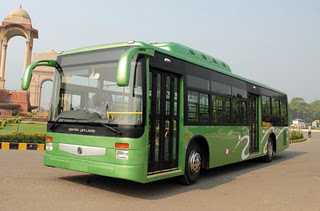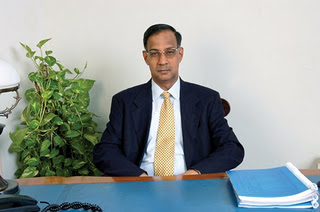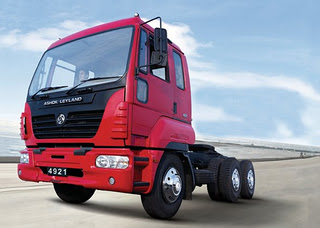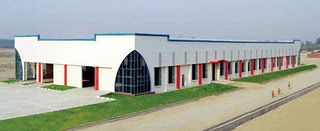Capacity expansion to 1,84,000 units by 2010

Ashok Leyland’s sales volumes moved up mainly due to the good performance in the bus segment which grew by 35 per cent. The company regained its market leadership in the bus segment with a volume growth of 51 per cent.
In terms of absolute turnover, Ashok Leyland has registered a sales turnover of approximately Rs. 7,730 crores during 2007-08 compared to Rs. 7,168 crores in the previous fiscal. Net profit rose by 6.4 per cent to touch Rs. 47 crores. It has thus continued its growth story for 10 years regardless of market conditions.

Mr. R. Seshasayee, Managing Director, said that Ashok Leyland compensated for the slowdown in the truck market by significantly improving its bus market share. International operations, as also the engines and spares businesses, contributed handsomely. “Our bottom line was benefited by some aggressive value engineering, sourcing initiatives and higher productivity. Despite rising input costs, we improved our operating margin by 60 basis points, to 10.40 per cent”.
It was a challenging and equally exciting year for the commercial vehicle industry. In 2007-08, the economy remained bouyant with a growth rate of 8.8 per cent. Infrastructure development was been reasonably good, and the general expectation was that the commercial vehicle industry would do well. However, as the year progressed, the total market for medium and heavy commercial vehicles was a bit of a disappointment with growth decelerating in the M&HCV; segment.
After six years of sustained growth, this segment started declining by six per cent from the peak attained in 2006-07.
According to Mr. Seshasayee, the growth in the sector was encouraged with the ready availability of finance at low interest rates. When the situation started changing with interest rates shooting, the replacement demand for vehicles was rather subdued.
While this was the case with the goods transport segment, the situation was very different in the bus industry, which grew quite handsomely. This was a general expectation for many years due to the improved road network and infrastructure. And with the added transportation facilities, the market for buses expanded, and this came as a solace for the industry with a growth of 34.72 per cent last year.
In the domestic market, the passenger segment of AL expanded by close to 52 per cent from 12,007 vehicles to 18,244 units. In the goods segment, sales dropped by 10.5 per cent from 64,144 units to 57,364 units. In fact, the drop in the goods transport segment was offset by an increase in the passenger segment.
Mr. Seshsayee further said that in the medium and heavy duty segment, the overall passenger market grew by 35 per cent, while Ashok Leyland registered a growth of 52 per cent. This growth was evident both with private operators and STUs. This confirmed the fact that AL products are more competitive and earned more for the vehicle owners. The company has earned a pre-eminent position in the bus segment and the current growth is expected to continue in the coming years.
In goods transport, Ashok Leyland lost its market share in the multi-axle segment but gained in the high growth tipper market by recording a growth of 22 per cent against the industry growth of 19 per cent. The tractor trailer segment is another growth area. Although the company lost its marketshare in the first two quarters, it gained a lot in the last quarter after the launch of the 4921 tractor trailer model. The company sold nearly 400 units in the last quarter alone.
Referring to exports, the Managing Director observed that sales overseas grew by 21 per cent at 7,285 vehicles (6,025 vehicles). Engine sales were up 37 per cent, with additional revenue coming from the newly started genset business. Sales of spares jumped 45 per cent, with revenues touching Rs. 7,912 million (Rs. 5,468 million). In tune with market trends, the fully built vehicle sales grew by 25 per cent to 9,040 units.
He said: “There is high growth in the lower end of the market, which is the light commercial vehicle segment. Equally the top end segment like high end tippers and tractor trailers are growing very well. The medium duty vehicle which has been the sheet anchor of the commercial vehicle industry for many decades finally gave way to heavy duty vehicles and light commercial vehicles.”
New projects
As for new projects, the year 2007-08 was significant for Ashok Leyland. The company signed some major joint ventures, the most important of which was with Nissan. The project is progressing well, and the first set of products are expected to be rolled out by 2010-11.
Last year Ashok Leyland had announced a JV with Alteams for high pressure die castings (HPDC). This project has taken shape and is moving forward. The land has been acquired near Cheyyar in Tamil Nadu. Commercial production has started at a temporary location, and the entire operations would be moved to the new facility soon. The JV will primarily focus on the automotive and telecommunication sectors. Mr. Seshasayee said that globally the market for HPDC is encouraging and the company hoped to get a good share of this business.
The company had also announced a JV with Siemens VDO for Automotive Infotronics. Post signing of the JV, Siemens VDO has been globally acquired by the Continental Group. Mr. Seshasayee shared that Continental has reconfirmed and even heightened its commitment to the project. In the coming years “we expect lot of new products to be launched from this JV, and some of the existing products from the ALERT will move over to the new JV which will handle this more competently because of the back-up from Continental.”
New products
As part of its new products plan, Ashok Leyland proposes to get the phase 1 version of the iBus on the road this year. To address the growing tractor market, the company is extending its range of tractors. In the current year, 4921 tractors and 3121 multi-axle vehicles are being taken up for full scale production and all-India marketing. Ashok Leyland also plans to launch several new products in the domestic market, particularly in the growing segments like tractor trailers where it would launch the 4930 model, the top of the line model powered by 300 hp engine. Another innovative product to be launched is the side tipper that renders tipping easier, more convenient, more stable and a whole lot quicker. It is ideal for operations on the roadsides and closed sheds.
The 8X2 is a growing segment and most of the truck manufacturers have launched a m
odel in this segment. AL’s 3121 was launched last year, and the company expects high sales of this model in the domestic market during the current year. The 8X2 delivers 25 per cent extra rated payload with the addition of an axle.
Another important product launched during the year was the 4921 tractor trailer. Although the model was launched in the last quarter of 2007-08, the company sold over 400 units in a short period. AL claims that its model has the highest permitted payload in this segment under the CMVR. The 4921, has been well accepted in the market giving AL leadership in the 49-tonne segment.

The company’s 2518 tipper has also faired well. It is of significance that the tipper market, particularly in the mining and construction segments, is moving towards higher productivity machines. Hence the company has improved the product features further and equipped it with a high-power engine and eight-speed gearbox and bogie suspension. The new product, due for launch soon, would hopefully dominate the growing tipper market.
Bus segment
AL has traditionally been a very strong player in the bus segment. In the high end coach segment the company plans to make commercial production of Luxura, which has been undergoing test for the past couple of years. The Luxura coach is built at the Irizar TVS plant. The company is targetting sales of 100 plus vehicles of the Luxura during the current year. These are fairly ambitious targets considering the fact the high end coach segment still remains a very small segment.
The city bus segment has witnessed a lot of action last year. Ashok Leyland has developed its low entry city buses in order to cater to the demands of the Delhi Transport Corporation (DTC) tender. The company boasts of having a product for every application in the bus segment. “We have a low entry bus with no-step to three-steps. We have developed an ultra low entry bus with 390mm step height, CNG BS 111 model and this bus is ready to respond to the requirement of Delhi Transport Corporation (DTC) in the context of the BRTS and Commonwealth Games. We have reponded to the DTC tender and awaiting final results,” added Mr. Seshasayee.
Mr. Seshasayee said: “The new low floor city buses has been developed jointly with a Chinese bus manufacturer. However, a great deal of customisation and engineering by AL engineers has gone into the development of the city bus. We have always had close to leadership position in buses, and we will consolidate that position. We will have our own fully-built solution in every segment, be it the minibus, luxury bus or citybus. Some of these buses would be coming out of our own units, or through our JVs or through contract bus manufacturers. We are plugging every gap by offering an increasing number of options in the bus segment. We are also looking at some acquisitions in the bus business outside India.”
AL has also developed the country’s first one-litre-per cylinder, 6-cylinder CNG engine for buses, using multi point fuel injection (MPFI) based on the H series platform. This model will meet Euro IV emission standards ahead of the mandate in India. The company plans to use this engine platform both in the Indian and overseas markets.
Capacity expansion
On the issue of capacity expansion, Mr. Seshasayee disclosed that the company is planning to invest Rs. 3,000 crores over the next three years. The investment would be mainly for the capacity hike at the Uttarakhand plant, the new engine and gearbox lines at Ennore and for new product developments. With all the investments in place, the company is targeting a cumulative capacity of 1,84,000 vehicles by 2010. The company is setting up a state-of-the-art plant at Uttarakand which will be benchmarked with global standards. The plant will be commisioned by March 2009.
Mr. Seshasayee expressed confidence that despite the slowdown in the CV segment, Ashok Leyland would continue with the planned capacity expansion. “We are going ahead full steam and are poised to take advantage of this market growth, and capacity which used to be a limiting factor so far should’nt affect growth anymore”.
The company is also working on areas of improving productivity and cost improvements and laying emphasis on development of young executives, as in the case of the new iBus which was designed and developed by a team of 25 young talented engineers.
Global foot print
Ashok Leyland is also improving its global footprint both organically and inorganically. Some strategic markets being targeted include Indonesia, Syria, Vietnam, Thailand, Honduras, Venezuela, Russia and the CIS.
International operations will be boosted, with the AL chassis and bus assembly plant proposed to be set up at Rakia in the UAE. Slated to commence operations this year, the plant capacity is being doubled to 2,000 vehicles per annum, in response to market demand from the Gulf region. The introduction of the Newgen cab and a range of specially developed truck models will help the company penetrate some of the current markets and enable entry into a few new ones.
Mr. Seshasayee also referred to the Avia project in the Czech Republic and said that the new company is functioning very well in terms of the new products developed. The overall cost is expected to come down by 30 per cent by sourcing components from low-cost countries, including India. In India, Avia will be the successor product to the Ecomet, and will be launched in three to four years’ time.
Concluding his remarks Mr. Seshasayee said that the commercial vehicle segment in the country is currently on a low profile for a variety of reasons like hardening interest rates, rising input costs, mounting inflation and lower investment flow into the country. He expects a high single-digit growth for the CV segment this year.
AL-JBM joint venture for components making

Ashok Leyland and JBM Auto Ltd. have signed a joint venture agreement to set up state-of-the-art facilities at the AL Complex in Uttarakhand, near Pantnagar, to cater to all of Ashok Leyland’s sheet metal components requirements. The agreement was signed by Mr. Vinod K. Dasari, Chief Operating Officer, Ashok Leyland, and Mr. S.K. Arya, Chairman, JBM Group.
Mr. Dasari disclosed on the occasion that Ashok Leyland is setting up integrated facilities at Uttarakhand involving an approximate investment of Rs. 2,000 crores. It will provide land in the complex to the JV. Operations will start in the new unit in 2010 in line with Ashok Leyland’s plans and its commercial vehicle production.
Mr. Arya said the joint venture will leverage the expertise of the JBM Group, a giant in sheet metal technologies, to become a single source for all sheet metal component requirements for Ashok Leyland’s facilities at Uttarakhand. JBM Auto will hold a majority holding in the strategic alliance with a stake of 74 per cent, while Ashok Leyland will hold 26 per cent. The estimated investment in the JV, which will have large pressing and welding facilities too, is ar
ound Rs. 100 crores.